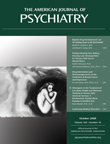Dr. Douglas Replies
To the Editor: Drs. Hellerstein and Markowitz offer the important reminder that although supportive psychotherapy may be among the most widely prescribed and commonly practiced forms of psychotherapy, surprisingly few well-designed controlled trials examining its efficacy have been published in the literature. They correctly emphasize the need for further clinical trials to establish the legitimacy of supportive psychotherapy as an evidence-based form of psychotherapy with scientifically proven efficacy. However, while the field of supportive psychotherapy needs to be defined in a manual for the purposes of such research, it is not clear to me that the use of manuals is the best way to teach psychiatric residents. This will no doubt be an ongoing topic of debate for some time to come.
Ian Douglas Rushlau, Psy.D. brought to my attention the related point that in the psychological literature, there already exists a rather voluminous body of research pertaining to “non-directive” or client-centered therapy, a form of therapy carrying a different moniker, which is similar in many respects to supportive psychotherapy as I described it.



